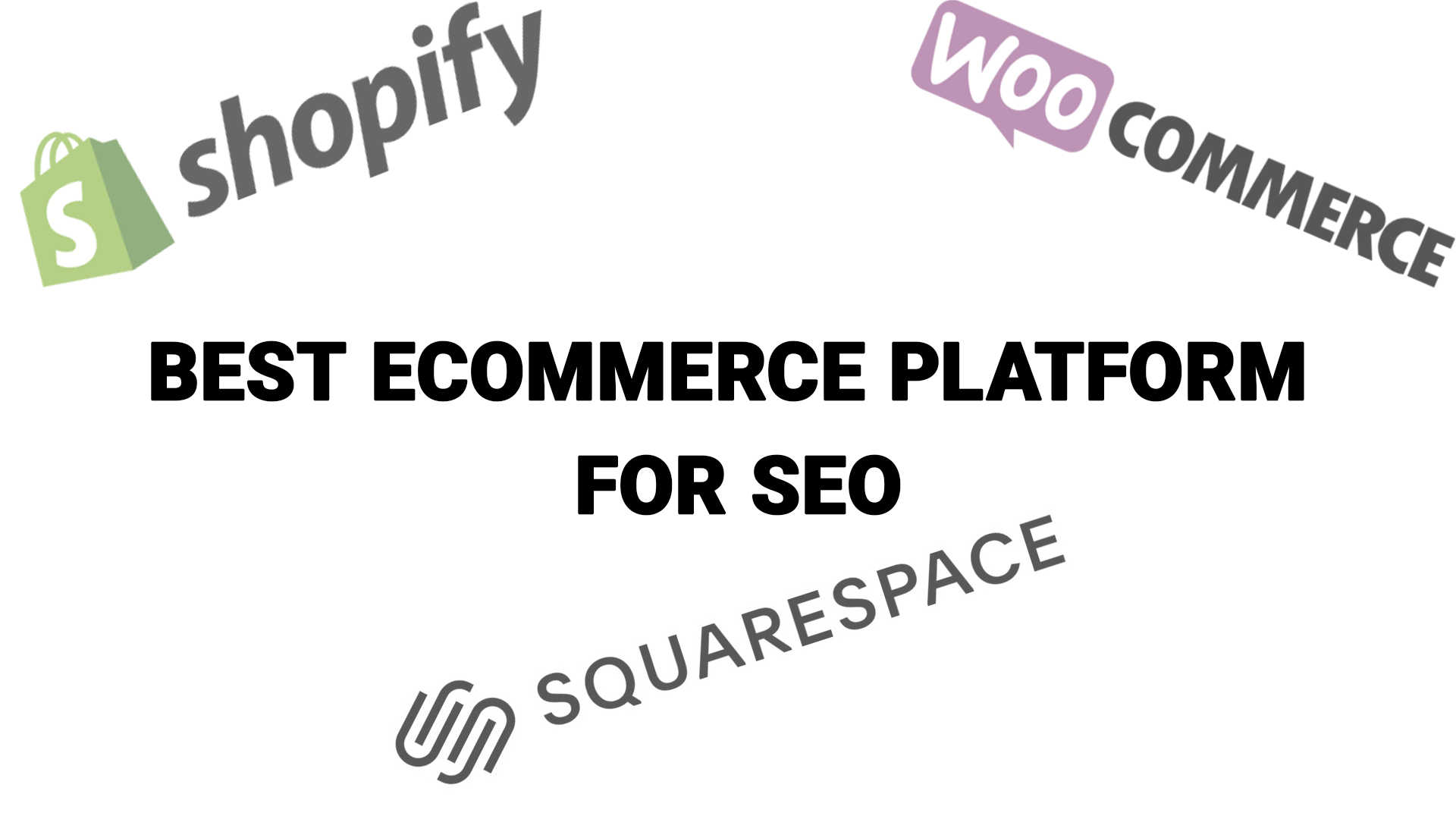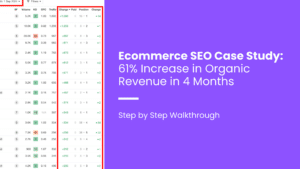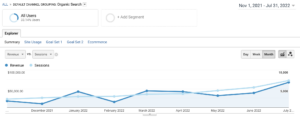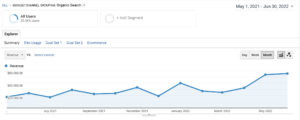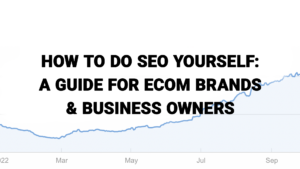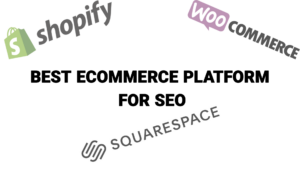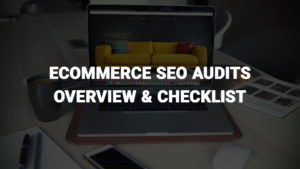Outside of your brand and products, one of the most important decisions you can make for your online business is choosing the right ecommerce platform. While SEO or Search Engine Optimization isn’t the only marketing channel you’ll use for your ecommerce store, it is the best way for your brand to show up on search engines like Google. This post will dive into the factors you should consider when choosing an ecommerce platform for SEO.
What SEO Factors to Consider When Choosing an Ecommerce Platform
No matter which ecommerce SEO platform you choose to go with, the best solution for your online store will be the platform that not only meets your needs but also has the most SEO-friendly features.
Site Speed
Out of all of the factors to consider for ecommerce SEO, one of the most important is site speed. Different platforms perform better than others when it comes to site speed, which can be affected by hosting, site architecture, and the amount of code that needs to run to load a website.
You should consider site speed for both mobile and desktop experiences, but place a larger emphasis on mobile optimization since some search engines, including Google, index websites mobile-first.
URL Structure & Canonicals
Ecommerce platforms are notorious for making their URL structures more complicated than non-ecommerce platforms. The more complicated structure also makes canonical website URLs an area of importance as well.
A canonical tag tells Google and other search engines which website page should be indexed and rank on Google. This is especially useful for ecommerce products, as products often have multiple variations, which create multiple URLs.
If you’re unfamiliar with SEO, this might not sound like a big deal but image a scenario where you have one product with 5 variations. Those 5 variations make 6 different URLs for that one product. Without telling Google which page to rank with a canonical tag, Google will index and try to rank all 6 URLs, which can cause keyword cannibalization and make it hard for any of those URLs to rank.
Sitemaps
A sitemap is basically a directory of the pages on your website that you can adjust to provide Google crawlers and other search engines with the exact pages you want indexed and gives you a way to explain how those pages or organized and categorized. Being able to provide and adjust the sitemap of your website can improve the crawlability of your store.
Structured Data
Structured Data can be added to web pages and inform Google of different types of information on a given page. One of the most important data markups for an ecommerce website is related to reviews. Sending Google review data can pull in the number of reviews and the review rating to Google search engine result pages, also known as SERPs.
If you’ve ever noticed products on Google showing the number of stars and reviews, this data is coming from the structured data markup on that product page designed specifically for reviews.
Easy Of Use
An ecommerce platform should make your life easier, not harder. Make sure you’re getting the right platform for your business. When doing your research, you’ll notice that different platforms are designed for businesses of different sizes. It won’t make sense to choose an ecommerce platform designed for enterprise solutions when you’re a one-person team with 5 products.
While all platforms will have a learning curve, make sure you choose a platform that is designed for businesses at the same level of sophistication as yours.
Meta Titles & Descriptions
The meta title and meta description are the headline and blurb that shows up on Google for each organic search result in a given search. Adjusting these can be a great way to improve organic rankings and CTR or click-thru rate.
You should make sure your ecommerce platform makes it easy to adjust both of these tags as they are a crucial part of optimizing your website.
Built-In SEO Fields
Closely related to meta titles and descriptions, are built-in SEO features. In addition to meta title and description fields, this would include adjusting URL slugs, image alt tags, and parent-child page relationships. All of these items can always be adjusted by a web developer in the actual website code, but you’ll want to be able to adjust these without the help of a developer in your platform’s page editor.
User Experience
While user experience matters on any website, ecommerce sites bring a special experience to the fold: the checkout experience.
You can spend a lot of time or money designing an engaging and easy-to-use website, but for many ecommerce platforms, the backend of the checkout process allows for very few customizations. For most platforms, you get what you get.
Since your customers will be entering their personal and credit card information into your website, you want the checkout experience to be seamless, feel trustworthy, and most importantly, familiar. A poor user experience at the checkout can be an easy way to lose sales.
Product Management
If you have a large number of products, product management will be a key part of your ecommerce platform research process. Adding and managing products can eat up a lot of time if the process is difficult or unintuitive.
Another key part of product management is how collection pages are managed. Collection pages can be a key component of your SEO strategy as they can rank well for some of your most important keywords.
Blog Management
While the main focus of your ecommerce site will be the products you carry, blog content can be used to help your website rank for different keywords as well. Being able to manage and add blog content easily to your website should be taken into consideration when choosing your ecommerce platform as blogs should be a key part of your SEO strategy.
Hosting Options
As mentioned earlier, site speed is one of the key SEO factors you should pay attention to when choosing an ecommerce platform. One of the items that can have a dramatic effect on site speed is the web hosting used to host the website files.
When someone types your website into a browser, the website is loaded from a web server that is storing your website files.
Some ecommerce platforms offer little to no options for hosting and are often referred to as a hosted ecommerce platform. These platforms have their own servers that they provide as a part of their monthly fee. Others platforms are self-hosted ecommerce platforms and allow you to host your online store wherever you’d like.
Ability to Scale
Every business wants to succeed and when you choose your ecommerce platform you should keep scaling your business in mind.
Some ecommerce platforms might be limited in their ability to scale, even if they might be a decent choice for you to start your business on, while others might be able to help you go from $0 in revenue to multi-millions in sales.
Ease of Adding in Google Analytics and Other Tracking Tools
In order to understand your progress and leverage other marketing channels, you’ll need to add tracking tags for Google analytics and other marketing tools. Some platforms make this really easy to do, others will make you want to bang your head against the wall.
Best SEO Ecommerce Platform Guide: Comparing the Most Popular Ecommerce Platforms for SEO
Without further ado, here’s our guide to the best SEO ecommerce platforms. We’ve highlighted the core features of each platform, the pros, and cons, as well as what type of business the platform is best for and its pricing.
Shopify
Shopify is the go-to ecommerce platform for many business owners. Its ease of use, pricing, and options for using pre-built themes and apps to grow your online presence makes it one of the best ecommerce platforms on the market. While a solid choice for ecommerce SEO, there are some items, such as product, collection, and blog URL structures that most SEO specialists would prefer to be tightened up. That being said, all of our current ecommerce clients use Shopify and we highly recommend it.
Features
Easy-to-use website builder and themes
App directory for connecting other marketing tools
Built-in analytics
Online and POS options
Abandoned Cart Reminders
Pros
one of the easiest platforms to get set up on
a secure platform that users trust
Very affordable for new shops
Most shops will be able to scale with this platform
Easy to add products, collections, and content
Cons
not the best ecommerce platform for enterprise solutions
website speed can take a hit from the use of too many apps
URL structure is not the best for SEO
Are hosted on Shopify’s hosting, so you can’t move to a faster hosting platform
product options and variations can be limited
Best Fit For
New brands and entrepreneurs who need to get started and don’t have a budget for a developer on day 1
Existing ecommerce brands looking to grow on a reliable platform
Pricing
Basic pricing starts at $29/mo and 2.9% + 30¢ USD for every transaction
WooCommerce
WooCommerce is another one of the leading ecommerce platforms, especially if SEO is a priority. While I prefer the user experience of Shopify a bit more than WooCommerce, WooCommerce allows you to use WordPress, which is my favorite platform for any type of SEO. Additionally, WooCommerce allows for more complex product and variant structures.
Features
Easy setup and installation
Compatible with WordPress
Everything you need to run an online store
Pros
The best ecommerce platform for seo
Can be hosted on any hosting platform that supports WordPress
Extremely customizable product variations and checkout experiences
A scalable solution for ecommerce brands
Cons
can be more complicated than Shopify
May require the help of a developer of WooCommerce specialist
Requires the use of many additional WooCommerce plugins
Best Fit For
New Brands that require more flexibility than Shopify
Pricing
FREE! + any processing fees. While WooCommerce and WordPress are both free, WooCommerce does not come with hosting like Shopify, and some of the additional plugins you will need have associated fees as well
BigCommerce
BigCommerce falls down to what I consider the second tier of ecommerce platforms for seo. While a solid solution, it does have some limitations and from a performance standpoint, doesn’t compare to WooCommerce and Shopify.
Features
Drag and Drop Website Builder
Headless options to connect to WordPress
Built-In B2B Options
Pros
Easy to get set up without knowing any website code
Scalable
Options to host on BigCommerce or going headless and hosting on other platforms
Cons
The more advanced features require additional help from a developer
Very slow website speed
No built-in abandoned cart functionality
page builder does not support custom typefaces
harder to use than other ecommerce platforms
Best Fit For
Larger businesses looking for a low-cost solution
Pricing
Starts at $29/mo + any processing fees
Wix
You’ve probably seen a few ads for Wix. Unfortunately, it’s no secret that most SEOs speak very poorly of this platform, both from a general usability perspective and especially an SEO perspective. If I have a client on Wix, one of my first recommendations is to change platforms.
Features
Drag and Drop page editor
Free Templates
Pros
Inexpensive
Quick setup for new businesses
Don’t need to hire outside help to get started
Cons
extremely slow website speed
Not great for SEO
drag and drop builder is clunky
not very scalable
Best Fit For
Brands with an extremely limited budget
Pricing
Starting at $16/mo + any processing fees
Squarespace
Squarespace is another platform you’ve no doubt heard of or seen advertisements for. When it comes to platforms that aren’t WooCommerce or Shopify, I do find Squarespace to be the best of the second or third-tier ecommerce platforms. Though, to be transparent, I cringe every time their ads mention that their sites have “built-in SEO.” That isn’t a thing on any platform.
Features
24/7 Support
Easy-to-use templates
Quick setup for freelancers and new entrepreneurs
Pros
The free templates look pretty great!
Website speed is competitive with the best platforms
The user experience from a customer and business owner side is very friendly
Cons
Setting up pages and navigation is a bit cumbersome
The SEO settings are hard to find and I find most site owners don’t use them because they think the SEO is “built-in”
Less integrations and apps than other platforms
Best Fit For
Freelancers and small businesses that need a well-designed website on a budget
Pricing
$16/mo + any processing fees
Adobe Commerce (Magento)
Adobe Commerce, formerly known as Magento, is one of the most customizable platforms for ecommerce. If you run an enterprise business or have a business with very unique operations, Adobe Commerce has the flexibility to adapt to your exact needs.
Features
Page Builder
AI-powered product search and recommendations
Built-in B2B tools
Omnichanel fulfillment
Enhanced analytics, security, and performance features
Pros
infinitely scalable
the best B2B solution
can adapt to almost any business need
Cons
requires the help of developers and specialists
hard for non-tech employees to manage
expensive to maintain
Best Fit For
Enterprise and B2B-oriented businesses or businesses with unique operations and integration needs
Pricing
$22,000+ and any associated fees, development costs, etc. Definitely not for small businesses.
Etsy
Etsy is an ecommerce platform that is great for the makers and designers of the world. Have a hobby that you’d like to turn into a business? Etsy is a great place to start. This platform draws in millions of customers looking for handmade and unique gifts that can’t be found on Amazon or in big box stores.
Features
Setup in minutes
Manage on your computer or phone
built-in advertising platform
Pros
Super easy setup and business owner friendly
No need to worry about design or coding
A built-in community of sellers and buyers
Reliable and trusted platform
SEO opportunities both on Etsy and Google
Cons
Easy for your products to get lost in a sea of similar products
Very high fees
Many sellers need to rely on expensive ads to get their shop off the ground
Best Fit For
Craftspeople, makers, and hobbiests
Pricing
Etsy charges a $0.20 listing fee for each product, a 6.5% transaction fee + any additional payment processing fees
BigCartel
BigCartel focuses on serving artists and makers. While this sounds similar to Etsy, BigCartel does not have a built-in community or platform. I’ve seen BigCartel used by many bands and artists as an easy way to sell t-shirts and other merch related to their artistic discipline.
Features
Free themes
Sell online and in person
discounts and promotions
Pros
Very easy to use and setup
Designed by artists for artists
Nice design, which makes your works look great to customers
Cons
Product listing restrictions
Limited features compared to other platforms
Not the best for SEO
Best Fit For
Artists, Makers, and Musicians looking to sell merchandise
Pricing
Free up to 5 products, then $9.99/mo
Volusion
Features
Built-in Subscription Feature
Setup Warehouse locations
Themes and Page Builder
Pros
Editable Robots.txt file for SEO
Easy setup without sacrificing design and quality
Decent website speed – middle of the pack
No transaction fees if you use their payment gateway
Cons
More expensive than Shopify
Many common ecommerce platform features don’t kick in at the lowest pricing option
A selling volume cap at each plan level
Best Fit For
Anyone looking for an alternative to Shopify
Pricing
Starting at $35/mo + transaction fees if using a different payment gateway
Looking to Send Traffic to your Ecommerce Website?
While the platforms above will help you get started, your website will also need traffic. SEO can be a great way for ecommerce business to increase their online presence and start driving traffic and sales on a regular basis. Contact Noah Kain Consulting today to learn more about our Ecommerce SEO Consulting Services.
